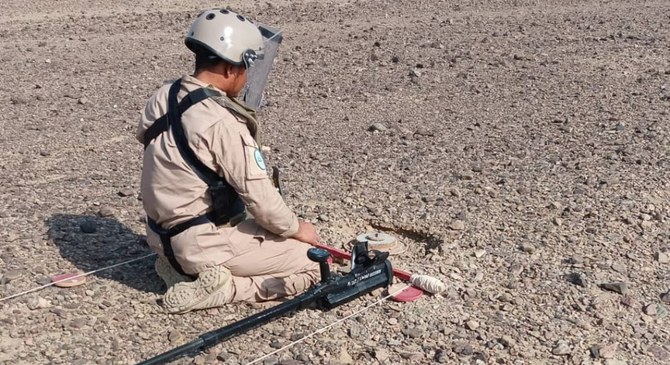In a significant stride toward ensuring the safety of Yemeni civilians, Saudi Arabia’s Project Masam, aimed at clearing landmines in Yemen, reported the successful dismantling of 733 mines planted by the Iran-backed Houthi militia during the last week of January.
The initiative, overseen by the Saudi aid agency KSrelief, has been pivotal in mitigating the threat posed by explosive devices scattered indiscriminately across various regions of Yemen.
The specialized teams involved in Project Masam’s demining operations targeted key areas, including Marib, Aden, Jouf, Shabwa, Taiz, Hodeidah, Lahij, Sanaa, Al-Bayda, Al-Dhale, and Saada.
A total of 602 unexploded ordnance, 126 anti-tank mines, three improvised explosive devices, and two anti-personnel mines were successfully destroyed, eliminating potential risks to the lives of innocent civilians, including children, women, and the elderly.
Since its inception in 2018, Project Masam has cleared a total of 430,323 mines, comprising 272,868 unexploded ordnance items, 143,044 anti-tank mines, 7,960 improvised explosive devices, and 6,451 anti-personnel mines. The initiative, directed by King Salman, aligns with Saudi Arabia’s commitment to assisting the Yemeni people and facilitating the delivery of humanitarian aid to those in need.
Ousama Al-Gosaibi, the managing director of Project Masam, highlighted the importance of the initiative, emphasizing that beyond mine clearance, the project also involves training local demining engineers and providing them with modern equipment. Additionally, support is extended to Yemenis injured by these explosive devices.
The extension of Project Masam’s contract in June 2023, at a cost of $33.29 million, underscores the commitment to sustaining the demining efforts for another year.
As the conflict in Yemen has displaced up to 5 million people, with many forced to flee their homes due to the presence of landmines, Project Masam plays a crucial role in creating safer environments by clearing areas such as villages, roads, and schools.






